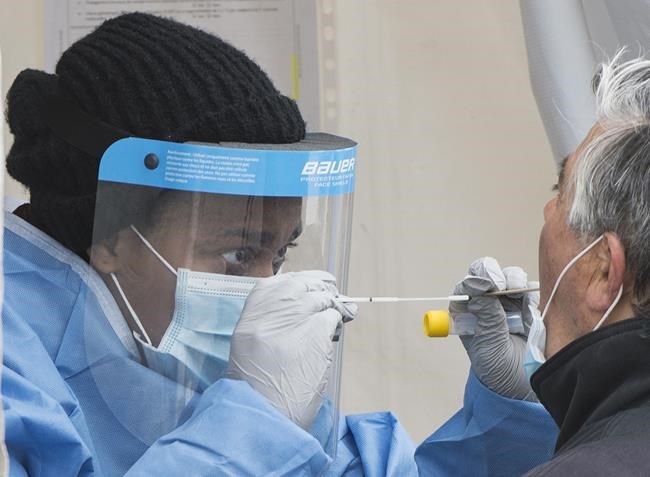Several provinces are looking to ramp up COVID-19 restrictions as new hotspots crop up across the map, pushing Canada's caseload closer to the 200,000 mark.
Canada's chief public health officer says the national count has climbed by an average of 2,300 cases per day over the past seven days, while an average of 20 people per day die from the illness.
As of Friday afternoon, there were 193,622 confirmed cases in Canada, and 9,721 deaths.
Ontario tightened restrictions on long-term care homes in three hotspots Friday, as the premier also made the reluctant decision to reinstate stricter rules on a fourth region north of Toronto.
Premier Doug Ford said the York Region will revert back to a modified stage 2 of the province's pandemic plan in an effort to curb an "alarming" surge in COVID-19 cases.
"We're seeing a rapid increase in the rate of infection, with the positivity rate of 2.77 per cent, above the high-alert threshold of 2.5 per cent," Ford said of York.
"Most concerning of all, critical care admissions are reaching alarming levels."
The move is set to take effect Monday and will remain in place for the region for 28 days. New strictures include a ban on indoor service at restaurants, the closure of gyms and movie theatres, and caps on public gatherings of 10 people indoors and 25 people outdoors.
Health Minister Christine Elliott said the province is assessing the situation in the Halton Region to see if similar measures are merited.
Ontario reported 712 new cases of COVID-19 on Friday, as well as nine new deaths related to the virus.
The majority of the province's cases are concentrated in Toronto, Peel Region and Ottawa. As of Friday, residents of long-term care homes in those regions are not allowed to leave for social or personal reasons.
The Manitoba government is also scaling up its restrictions on the Winnipeg area amid growing concern about community spread.
The two-week mandate, which comes into force Monday, prohibits gatherings of more than five people, shuts down beverage rooms and casinos, and restricts restaurants, lounges and retail stores to half-capacity.
Manitoba health authorities reported 75 new COVID-19 cases on Friday — a fraction of Thursday's record increase of 173 new cases in 24 hours.
Meanwhile, Quebec's public health institute urged Quebecers to shrink their social circles even further as the province reported another 1,055 new COVID-19 cases and one new virus-related death.
A report released Friday found that Quebec may have dodged a public health disaster by rolling out lockdown measures across much of the province earlier this month.
But the institute's forecasts suggest the regulations in these "red-zone" regions, which include Montreal and Quebec City, can only go so far to stem the spread of the virus.
Quebecers will also have to reduce their contacts with others by 25 per cent to bring the uptick in cases under control, according to the report.
The Listuguj First Nation, which is near the province's New Brunswick border, also announced it was shutting down most government operations after reporting its first COVID-19 case.
Nova Scotia is reporting one new case of COVID-19, while the Northwest Territories says three people have received presumptive positive test results for the virus.
Newfoundland and Labrador is reporting three new confirmed cases of COVID-19, all related to travel.
As hospitals admit a weekly average of 870 patients per day, Dr. Theresa Tam urged Canadians to do their part to reduce the burden on the health-care system by getting their flu shot as the seasonal virus converges with the second wave of the pandemic.
While the flu shot doesn't protect against the virus that causes COVID-19, Tam said getting vaccinated reduces one's risk of back-to-back or simultaneous infections that can lead to more severe health outcomes.
"Our best bet to keep everyone safer is to layer on all the protections we have available," Tam said at a news conference Friday.
Prime Minister Justin Trudeau told reporters that the federal government is prepared to step in to ensure provincial authorities are protecting older Canadians from the outbreaks that ravaged long-term homes in several regions last spring.
While some provinces handled the crisis better than others, Trudeau said the pandemic has laid bare chronic gaps in the long-term care system, and all levels of government share a responsibility to fix them.
"We've seen that those institutions haven't done a good enough job in this pandemic," he said. "To not take the moment of this crisis to reflect on how we can improve outcomes for everyone would be completely irresponsible."
This report by The Canadian Press was first published Oct. 16, 2020.
Adina Bresge, The Canadian Press



